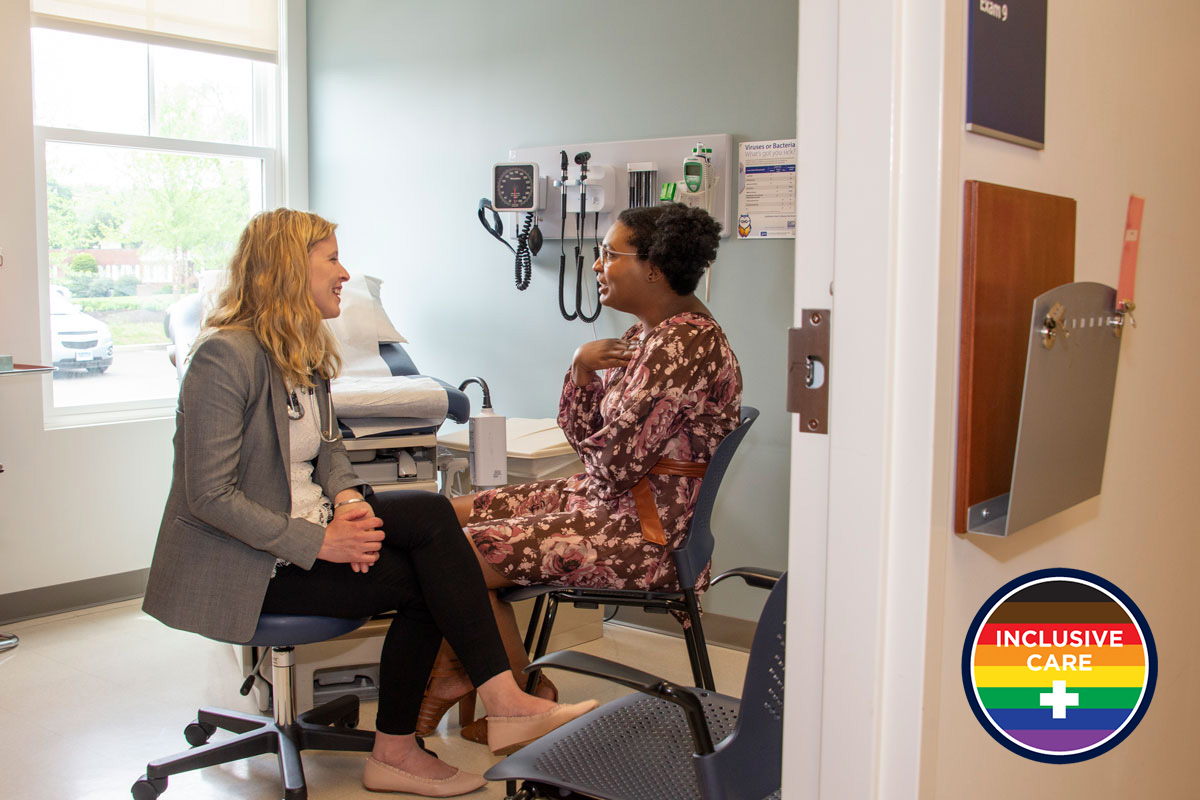Regina Guimond is 31, lives in Weatogue, is married, and is an esthetician by trade and full-time holistic medicine student.
She also is a transgender woman.
“I have always felt I was a woman, and was never completely OK with the identity I was living as before,” she says.
Guimond has been medically transitioning for three years now. Early in that process she started to see Britta Shute, a family medicine nurse practitioner at UConn Health in Canton, as her primary care provider.
“My endocrinologist recommended her, so I felt safe going to her, and once we actually met, we instantly clicked,” Guimond says. “My transition went really, really fast, I think mainly because I had such a great support system with Britta. But there were still a lot of hurdles that I had to go through, and I feel like the medical system could definitely streamline that to make things a lot easier for us.”
The pairing with Shute, who’s been providing LGBTQ+-specific care since joining UConn Health in 2016, was a natural fit.
“We know that too many transgender patients will forgo health care services when in imminent need because of past experiences of discrimination,” Shute says. “We are positioning ourselves at UConn as clinical leaders in strengthening ongoing efforts to improve LGBTQ+ patient visibility both within and beyond our institution.”

A Transgender Patient’s Perspective
I can only speak on my own life experiences, and every trans patient is different. But it is important to know and keep in mind these few things:
It is important to know and keep in mind these few things:
- We are human too, we just want to be seen as regular patients coming in for medical assistance.
- If you are unsure of a person’s pronouns, ask! If you aren’t sure how to ask try: “Hi there, I’m ‘your name’ I’ll be taking care of you today, I want to make sure you are comfortable so before we start what are your pronouns?”
- Not every trans patient is comfortable with their body, I certainly wasn’t, so asking permission to touch them before heading in to do so can help alleviate nervousness and may lead to needing alternative methods for certain exams.
- Not every trans person has dysphoria or feels the need to take hormones or even have surgeries to transition, and that’s okay, it doesn’t make them any less valid.
- Yes, we are trans, but that is not all we are. We have feelings, friends, family, fears, and dreams, just like you.
Going to the doctor can be stressful and sometimes embarrassing for everyone, cis (someone not trans) and trans patients alike, which can sometimes make your job even harder. But simply treating us with respect, compassion, and the best of your abilities is the most we could ever ask for!
—Regina Guimond
She cites a 2014 report from Lambda Legal, a nonprofit advocacy group for the civil rights of the LGBTQ+ population, that found that seven in 10 transgender survey respondents in the U.S. had experienced serious discrimination when accessing health care.
UConn Health has been making a safer, more welcoming, accessible environment for LGBTQ+ patients a greater priority.
“We strive not only to provide the most evidence-based, current medical therapies to our gender-nonconforming patients, but also to help them navigate other areas of their health care needs, including preventive services, specialties, and potential mental health and surgical referrals,” Shute says.
Perhaps somewhat lost in the COVID-19 pandemic is the emergence of transgender medicine services at UConn Health. The endocrinology practice opened a dedicated gender-affirming hormone therapy clinic in February.
“We have always provided care for transgender hormone therapy patients in the general endocrine clinic, but now we are trying to improve care with a dedicated clinic,” says Dr. Pooja Luthra, a UConn Health endocrinologist with expertise in transgender hormone therapy.
Additional therapies including some gender-affirming surgery also are available, as well as specialties such as ear, nose and throat surgery, pelvic physical therapy, cosmetic surgery, urological care, gynecology, and voice therapy.
That last one, voice therapy, is one that Guimond hadn’t realized plays such a vital role in transitioning.
“I didn’t know that there’d be vocal feminization therapy, which is super important,” Guimond says.
Enter Starr Cookman, a speech pathologist in UConn Health’s voice and speech clinic, who recognizes how perceived discrepancies between appearance and voice can cause emotional distress during an already challenging phase of life.
“The most powerful gender marker is one’s speaking voice,” Cookman says. “Even when someone’s appearance is definitively female, if she speaks in a low voice, she’s likely to be referred to as a man.”
It’s a phenomenon known as “being sirred.”
“The pain of it is deep, and perhaps the frustration even deeper,” Cookman says. “Imagine the emotional, physical, financial, and medical investment involved in achieving gender congruence, only to be misgendered simply by the sound of your voice.”
Guimond recently put her voice to work trying to help make things better for the patients who will follow her.
“I did just do a workshop with UConn med students, a few weeks ago, where a few people from the LGBTQ community were coming together to help the students understand how to treat us, how to make our experience a lot better,” Guimond says. “It was really fun doing that, helping to educate UConn’s students on how to ask questions without offending trans people, things like that.”
“She is definitely a strong patient advocate and is doing her part to educate the next generation,” Shute says. “We are increasing opportunities to do that, and further decrease future access issues and provider knowledge deficits.”
Not lost on Shute is the serendipitous timing of Pride Month, June, and the demonstrations against discrimination taking place today throughout the country.
“Pride commemorates the Stonewall Inn Riots of 1969, organized by two gender nonconforming people of color, standing up to discrimination and police brutality,” Shute says. “Pride is more than a celebration of love, identity, and community. It’s a way to come together to strengthen resolve to continue the fight for justice, liberation and equality for all.”
Learn more about transgender medicine services at UConn Health.



